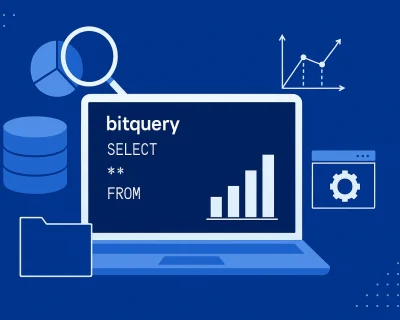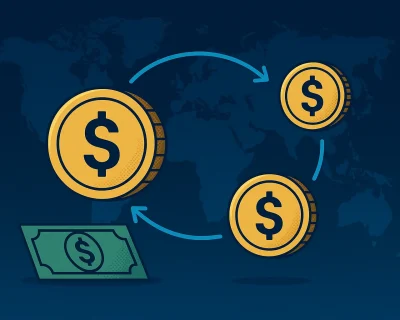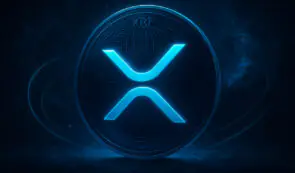10 Successful Blockchain Use Cases Outside the Crypto Industry
When we hear of blockchain, most of us instantly think of Bitcoin. Nowadays, blockchain is associated with a lot more cryptocurrencies than Bitcoin. Furthermore, the blockchain use cases extend to domains like supply chain, healthcare, voting, and many more.
Even most technologized industries suffer from security issues. Information friction, data collection from multiple sources, restrictions from servers or providers, paper records and documents, and human error can all cause major issues for a business.
Implementing blockchain across industries is thought to improve the quality and security of products and services. By bringing all the information in a digital unitary and unmodifiable database, anything could be traced transparently from point A to point Z.
Therefore, blockchain advocates have been continuously arguing for implementing this technology in businesses and governmental institutions.
But now, after blockchain specialists have promoted the usability of blockchain technology for more than a decade, the times are changing.
To better highlight this technology’s impact, let’s look at 10 companies that successfully implemented blockchain.
Blockchain in Supply Chain Management
There is a supply chain from supermarkets to vehicle producers, from FMGCs to any physical product sold on the market. Some are simple, and some are complex. A part of businesses gets everything they need from one chain. Some must gather their parts from all around the world. And the more suppliers a company has, the more difficult it is to keep track of its activity.
SIDENOTE. FMGC – Fast-Moving Consumer Goods are products sold quickly at a relatively low cost, such as packaged foods, beverages, toiletries, and other consumables.
Generally, big companies do a decent job of keeping track of their suppliers and have specific rules for choosing new suppliers. But today’s supply chain management system finds its faults in reliance on papers, too many sources of information, and lack of transparency in the source of a product.
Small mistakes in supply chain management can have significant consequences, such as Ebola, E.coli, or Salmonella outbreaks. As a matter of fact, in 2018 and in November 2019, E. coli outbreaks related to romaine lettuce were reported in the United States. And this is just one example of such events.
The same little mistakes give us electronics that break when we use them. A small error in your phone’s security software could leave you with an empty bank account or a stolen identity.
At the same time, trust issues make it exceedingly difficult for start-ups to collaborate with big companies and for companies to find suppliers for their products.
Blockchain use cases bring to supply chain management the transparency and trust it needs.
By sharing a single, common database, even the customer can track a product, ingredient by ingredient, from shelf to factory or farmer. Customers can even see the way the products were transported.
Through blockchain technology, the transporter does not have to worry if the sender packed the goods properly, and the recipient can check in real-time the stage in which their assets are. The company can also see if every procedure is carefully followed in the supply chain.
Therefore, a start-up that produces a specific good can be easily found inside the blockchain by another company looking for suppliers, and the risk of fraud is considerably lowered.
1. Carrefour decided to use IBM’s Food Trust platform and started in 2018 by tracking mashed potatoes and milk.
In 2021, Carrefour announced its intention to spread blockchain technology to trace textile products. Their final goal is implementing blockchain overall Tex BIO products’ supply chains.
SIDENOTE. Tex BIO is Carrefour’s exclusive textile brand, a unique extension that produces home textiles and baby clothes from 100% certified organic cotton.
Regarding Carrefour Bio, the chain of ecological farming and livestock products, in April 2022, they started implementing blockchain technology in multiple organic products. They began with some own-brand organic products and will expand to the full range of organic products.
Emmanuel Delerm, Carrefour’s blockchain project manager, told Reuters at a conference that blockchain tracking has already improved the sales of some tracked products.
2. KPMG launched a blockchain-based track and trace platform, KPMG Origins, in Australia, China, and Japan. The blockchain platform supports industries, including agriculture, resources, manufacturing, and financial services.
It combines several emerging technologies, including blockchain, internet of things sensors (IoT), as well as data and analytics tools to provide transparency and traceability to trading partners across complex industries.
3. Walmart partnered with IBM for food safety through blockchain, IoT, and smart contracts. By developing a hyperledger fabric-powered blockchain system, the firm can trace the origins of products, enhancing operational transparency and internal accountability.
Besides, Walmart started using blockchain to manage its supply chain. Now, they created an automated process for conducting invoices and payments to its third-party freight carriers.
The pilot version went live in January 2019, and they rolled out the DL Freight network to 69 other carriers in March 2021. Since the launching of DL Freight, below 1% of invoices have differences, reducing the costs of reconciliation efforts remarkably and allowing carriers to be paid on time.
Blockchain in Healthcare
The healthcare system is continuously evolving regarding new and improved treatments. But when it comes to patient procedures, things get complicated.
Physical registries and files or medical histories sorted by different companies that do not communicate with one another make the medical system quite rigid.
Blockchain in healthcare improves the overall security of patients’ electronic medical records and resolves the issues of drug authenticity and drug supply chain traceability. It also enables secure interoperability between healthcare organizations.
4. Coral Health Research & Discovery uses blockchain to enhance the medical process and automate administrative processes. The patient’s data is inserted into the distributed ledger, the platform connecting doctors, scientists, lab technicians, and public health authorities.
The platform also includes smart contracts between patients and healthcare professionals to ensure data and treatment accuracy.
5. Medicalchain manages to maintain the integrity of health records through blockchain while establishing a single point of truth. The platform has a record of the origin and makes the patient’s information available to requests from doctors, hospitals, and laboratories while protecting the patient’s identity from outside sources.
Medicalchain makes medical errors and insurance frauds less likely to occur.
Blockchain in the Travel Industry
Intermediaries, communication errors and difficulties, changes in the registries, and the lack of control a customer has over his registration significantly contribute to the reality of the current travel industry.
The blockchain community came in to help the industry with distributed ledger technology. Being time-stamped, verifiable, and transparent, with no single point of control, the blockchain is believed to eliminate the problem of lost baggage, deleted bookings, and identification troubles that travelers have.
6. Webjet is an online travel agency implementing a blockchain immutable distributed ledger. By recording all entries, they reduce the likelihood of incorrect or lost bookings and reduce the layers between sellers and consumers, and all this through Rezchain, their blockchain technology, which enables error-free hotel bookings.
In March 2021, Webjet invested in LockTrip, one of the essential aspects of the deal being the migration of the Rezchain booking verification system onto the Hydra blockchain. Hydra blockchain was developed by LockTrip and is a genuinely decentralized proof-of-stake network that emerged from the combination of Bitcoin, Ethereum, and Qtum.
7. Travala implemented blockchain technology and even an NFT-based rewards system in its travel booking platform as well. Moreover, their system accepts both fiat payment methods and over 80 cryptocurrencies.
Also, Travala announced, in June 2021, the launching of Dtravel, a blockchain-based marketplace for short-term rentals. Dtravel is community-owned through the Dtravel DAO, and in 2022, Dtravel shifted to become a direct booking channel for rentals.
Blockchain in Music
The music industry may be one of the harshest industries, with very few artists becoming successful. Musicians have a tough time making a living out of their art. The album deals are unfair, licensing is insufficient, and the intermediaries are too many.
The blockchain comes as a solution in the form of a decentralized system with no single point of control, in which the musicians can get closer to consumers, and the consumers can buy music and license directly from artists.
8. UJO was built as a blockchain music platform in which digital rights management enables fairness and transparency in the process of artistic expression, allowing musicians to make a living from their work and the fans to connect directly with the artists.
Blockchain for Voting
The democratic process requires all of us to express our opinions by voting. Nowadays, when it comes to the voting system, things have changed a lot, and most people have the right to vote in democratic countries.
Unfortunately, the procedure mainly stayed the same, away from the technological evolution, using papers, stamps, and lots of people to count and organize the votes. That translates into a heavy infrastructure that costs millions of dollars and mountains of paper.
With the widespread use of the internet, online voting has become more and more popular. However, the risk of hacking into the election process made it impossible to move votes into the digital world.
The technology used by Satoshi Nakamoto for bitcoin proved to be sturdy against hacking and blockchain government use cases, including blockchain voting, which became more and more popular.
9. Voatz developed a blockchain-based voting system, and West Virginia used it in the 2018 midterm elections for the Senate and House of Representatives and for state and local offices. Soon after the elections, the FBI investigated a hacking attempt.
However, the attempt proved unsuccessful against the blockchain platform used by Voatz and proved to be safer than email voting. Besides West Virginia, Voatz started being used by Denver and Utah County as well.
On September 26th, 2022, Voatz kicked off its 100th election, which also happened to be its first-ever governmental election in Ontario, Canada.
Blockchain for Journalism
Journalism is one of the industries that the evolution of technology has hit the hardest. Digital media is getting more attention, while traditional media, especially newspapers, is losing terrain.
Ads, sponsored articles, and fake news were already inconvenient for the public but were essential for journalists to generate revenue. Along with digitalization, these problems have intensified. Click baiting has taken over, and the harvesting of user data and serving of ads has become the norm. Consequently, public trust in media has reached an all-time low.
Blockchain is thought to solve some of today’s journalism’ problems by offering a way to keep the facts in the open, verifiable, and unmodifiable.
10. Popula is a blockchain-based project. Basically, it is a web news, arts, and culture magazine established in 2018 that uses blockchain to complement its workflow. On Popula, if you want to leave a comment, you need to pay a fee of 5 cents in the Ethereum cryptocurrency (ETH). This measure protects conversations from trolls and fakers and raises enough capital to keep the platform ad-free. Besides, you can tip your beloved authors using ETH.
The magazine also stores its archive on the blockchain, making it immutable and permanent.
One of the most notable blockchain projects for journalism used to be Civil.
Civil used blockchain technology to develop an independent journalism network organized in newsrooms. The network was self-governed and regulated through a standard of journalism called the Civil Constitution.
Unfortunately, the project shut down in 2020, but it inspired other similar projects, including Popula.
Final Thoughts
After years of advocating the use of blockchain by businesses and governments, the world seems to see the potential it holds. Aside from enthusiastic start-ups, big companies are already exploiting blockchain capabilities.
A new paradigm in technology and business is on its way. It will be about transparency and collaboration. However, blockchain is still a young technology that has yet to prove itself before becoming widespread.













